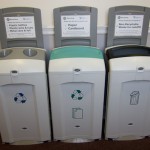OK, if asked to state what the waste hierarchy is then I guess a lot of people would be stumped. However, most people have heard of reduce, reuse recycle – a lot of waste collection vehicles have it plastered all over their sides. This has become an easily repeated mantra, but, what does it mean in practice and why is it important, particularly for business?
Taking the latter question first, a recent change to the waste regulations (2011) states that:
‘ businesses who import or produce, collect, transport, recover or dispose of waste, or who operate as dealers and brokers, must take all reasonable measures to apply the waste hierarchy when the waste is transferred’ (taken from the environment agency website).
The waste hierarchy also has recover and dispose – this means that where possible a company should consider energy recovery through either combustion or anaerobic digestion. Any waste transfer notes and consignment notes will, from the end of September 2011, include a declaration that the waste hierarchy has been considered in the disposal of the waste.
To me, this poses a question – if I can have my waste collected by two companies, one of which takes any unrecyclable waste to an energy recovery facility and one that sends to landfill, do I have to go with the first company if I am to comply with regulations? Do I need to check whether there is methane recovery from the landfill? Does that count in the same way as the energy recovery? So far, I have not been able to definitively answer that question. The fact that some companies still send to landfill (and therefore charge the landfill tax and its associated escalator) makes me think that there is a loophole somewhere. From an economic point of view, my research to date has shown that removing landfill tax by sending product to energy recovery saves a considerable amount of money – by 2014 the cost will be £80 per tonne and most standard skips hold around half a tonne each time they are emptied. (The rights and wrongs of burning potentially valuable resources is a topic for another blog post.)
One of the other major changes in the regulations doesn’t come into effect for another four years, but concerns the collection of recycling and will affect quite a number of companies. At the moment companies can salve their conscience and save making too much effort by having what is called Dry Mixed Recycling (DMR). This means that cardboard, paper, office waste, bottles, cans, plastic etc., can all be put in one container which is later sorted by the waste company (who charge a little more for this as well). I have also heard of some companies that collect separated waste in one vehicle – thus begging the question as to why separate in the first place. I have two problems with this practice. The first is purely practical. The value and usefulness of these recyclates is lowered because they are contaminated – this is particularly true of the cardboard and paper. The second is a matter of perception. If someone has to make more of an effort and think about what they are recycling because they have to consider and separate the different types, does the importance of recycling increase in their mind.
From 2015 anyone who produces paper, glass, plastic or metal waste streams will have to ensure they have taken all practicable steps to ensure they are separated. This will mean a change in collection facilities for many companies and therefore a change in culture. My team and I instigated a separated recycling system on one of our sites a few years ago. We did encounter some resistance at first, but eventually most people did come on board. The main problems result from lorry drivers throwing anything they can in the recycling skip.
In later posts I will go through some of the things that can be put in place to reduce your waste to landfill as well as taking you along the journey I am starting as I attempt to instigate a waste management practice at work.
